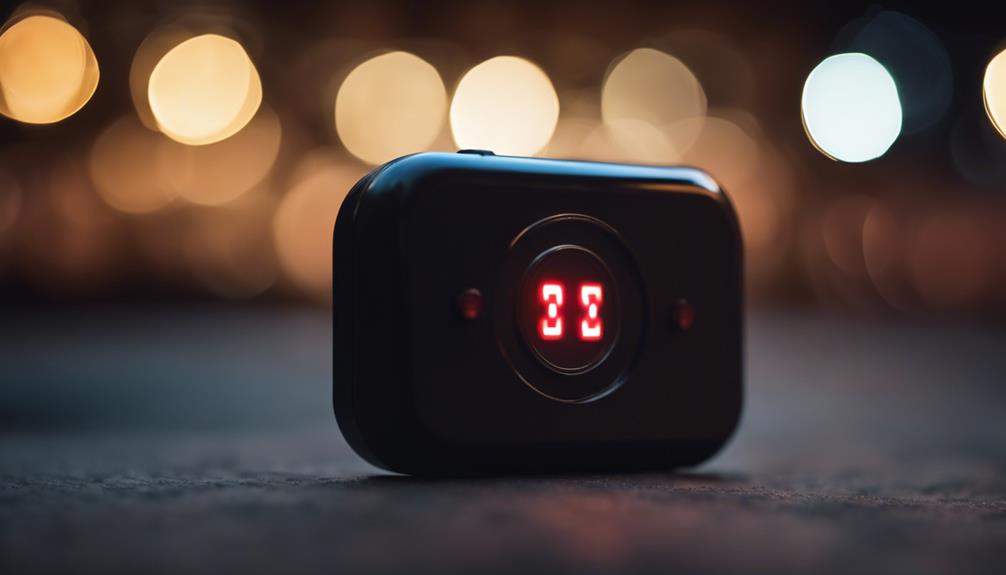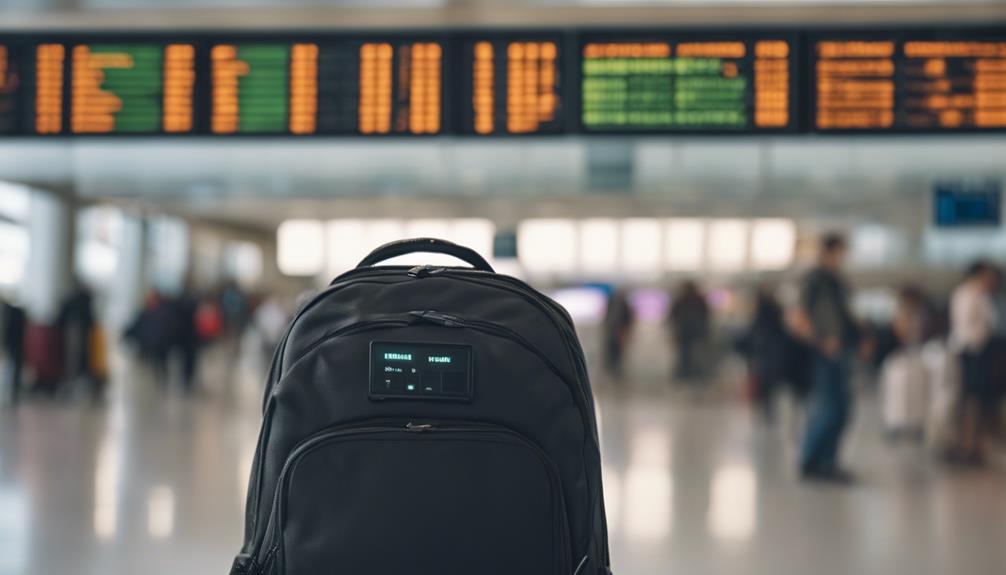
Brainstorm Security Shop

For Orders Over $199

On Any Of Our Products

Details On Refund Page
As you pack your bags for your next adventure, have you considered the role a personal alarm might play in your travel safety arsenal? These handy devices are not just simple gadgets; they’re a proactive measure to enhance your security in unfamiliar environments. With options ranging from high-decibel sirens to discreet alarms disguised as everyday items, choosing the right one could be crucial. But beyond the basic functionality, do you know what features to look for and how they align with the laws in your destination? Let’s explore why this small tool could make a big difference in how you experience your travels.
Personal alarms can significantly enhance your safety while traveling, alerting you and others to any immediate dangers. When you’re exploring unfamiliar places, especially those with high crime rates or limited security, carrying a personal alarm offers an extra layer of protection. It’s a simple precaution that can deter potential attackers and alert passersby, increasing the likelihood of intervention or assistance.
You might feel safer knowing you’ve got a quick way to draw attention if you’re ever in a precarious situation. Whether you’re walking through a deserted parking lot at night or navigating a crowded festival, the presence of a personal alarm can make you less of an attractive target to potential criminals.
It’s not just about preventing physical attacks; it can also be a lifesaver in various emergencies, such as medical crises or when lost in a foreign area.
Investing in a personal alarm shows that you’re proactive about your personal security. It’s a small, often inexpensive device that packs a big punch in preserving your peace of mind. You’ll find that being prepared with one allows you to enjoy your travels more fully, knowing you have a way to protect yourself effectively.
You’ll find various types of personal alarms available, each designed to suit different needs and situations. Some are small, discreet devices that easily attach to your keyring or slip into a pocket. These compact models are perfect for everyday carry, ensuring you’re always prepared, no matter where you are.
Others are designed more robustly, with features like rugged exteriors, making them ideal for outdoor adventurers who might face harsher conditions. There are also alarms that come with additional functionalities, like a flashlight or a built-in GPS tracker, tailored specifically for those who travel solo and might venture off the beaten path.
For nighttime safety, consider alarms that incorporate a bright strobe light or emit a loud, piercing sound capable of drawing attention from a distance. These are particularly useful in situations where you need to scare off an attacker or alert passersby.
Don’t overlook wearable options, either. Some personal alarms are designed as wristbands or pendants, blending seamlessly with your attire while providing easy access in an emergency. This type is especially handy if you prefer something that doesn’t require digging through a bag or pocket to activate.
When selecting personal alarms, consider key features such as volume, ease of use, and portability to ensure it meets your safety needs.
You’ll want a device that’s loud enough to draw attention when you need help. Look for alarms that can emit a sound of at least 120 decibels. This volume can cover large areas and even penetrate through walls, increasing your chances of someone hearing it.
Ease of use is crucial. You don’t want to fumble with complicated settings or buttons in an emergency. Opt for a model with a simple activation mechanism, like a pull pin or a push button, that you can operate quickly and without looking.
Portability is also key. Your alarm should be lightweight and compact enough to carry on your person at all times. Whether it clips to your belt, fits in your pocket, or hangs on your keychain, it should be easily accessible.
Lastly, durability matters. Your travel conditions might vary, so it’s wise to choose an alarm that’s weather-resistant and rugged. If you’re an adventurous traveler, consider a waterproof model that can withstand harsh environments. This ensures your alarm remains reliable, no matter where you are.
Before setting off on your travels, familiarize yourself with how to operate your personal alarm efficiently. Start by understanding how to activate and deactivate it. Most personal alarms have a simple mechanism, such as pulling a pin or pressing a button. It’s crucial you practice this so you’re comfortable using it under stress.
You’ll want to check the alarm’s battery life regularly. Ensure it’s fully charged or has fresh batteries, depending on the model. Don’t forget to test the alarm before you leave. You need to know it’s working properly and can be loud enough to deter an attacker and attract attention.
Carry your alarm in an easily accessible place. You won’t have time to rummage through your bag in an emergency. A good spot is on your keychain or attached to a belt loop or the strap of your bag.

Several top brands stand out when choosing a reliable personal or travel alarm for travel. You’ll want to consider the Vigilant Personal Alarm, which boasts a 130 dB sound level—loud enough to alert anyone nearby in an emergency. It’s user-friendly and includes an LED light, which is handy in low-light situations.
Next, there’s the BASU eAlarm+. This compact device can be easily attached to any item, like your backpack or belt loop, and emits a powerful 120 dB sound. It’s particularly appealing because of its versatility and ease of use.
For something a bit more discreet, you might look at the SLFORCE Personal Alarm. Designed like a keychain, it blends seamlessly with your keys or bag but packs a loud punch with a 130 dB alarm. It also features a built-in LED light, making it a dual-function safety tool.
Lastly, the Taiker Personal Alarm for Women is notable not only for its 140 dB alarm but also for its stylish design. Available in several colors, it appeals to anyone looking to maintain style without compromising on safety.
Each of these brands offers something unique, so you’re sure to find one that meets your specific needs and comfort level.
Now that you’ve selected a reliable personal alarm for your safety while traveling.
First off, always keep your personal alarm within easy reach. Don’t bury it in your backpack; rather, attach it to your belt loop or handbag, so you can activate it quickly if needed. Practice pulling the pin or pressing the button a few times to ensure you’re familiar with how it works.
Next, make it a habit to check the battery before you depart on any trip. A non-working alarm won’t do you any good, so ensure it’s fully functional and loud enough to draw attention in case of an emergency.
When you’re out exploring, stay aware of your surroundings. If you ever feel uneasy or notice someone suspicious following you, don’t hesitate to use your alarm. The loud sound is designed to startle the assailant and alert others nearby.
Lastly, consider using your personal alarm even when you’re inside your hotel room. You can hang it on the door handle to act as a deterrent or alert system if someone tries to enter unexpectedly.
You should also familiarize yourself with the legalities of carrying a personal alarm, as regulations can vary significantly between different locations. While most countries allow travelers to carry personal safety alarms, there are exceptions and specific rules you must be aware of to avoid legal issues.
In the United States, personal alarms are generally legal, but you’ll find variations in the decibel limits allowed by different states or cities. It’s essential to check the local laws where you plan to visit.
In European countries, most personal alarms are legal, but carrying devices that resemble weapons, even if they’re non-functional, can land you in trouble. Always confirm that your device is permitted in the countries you’re traveling to.
In some Asian countries, particularly where regulations are stricter, such as Japan, personal alarms must comply with local laws concerning noise levels and types of alarms. You might need to purchase a specific type of alarm sold within the country to meet these criteria.
Don’t assume what’s acceptable at home is okay elsewhere. Always do a bit of research or contact local authorities to ensure your personal safety alarm won’t cause you any legal headaches during your travels.
Now you’re equipped with the knowledge to choose and use a personal alarm effectively. Remember, it’s not just about having one; it’s about knowing how to use it to feel safer during your travels.
Always test it regularly and keep it within easy reach. With the right personal alarm and a few safety strategies, you’ll enhance your security wherever you go.
Stay aware, stay safe, and let your personal alarm be your travel-ready companion.

Brainstorm Security Shop
1867 Caravan Trail
Ste 105
Jacksonville, FL 32216
Call us toll free: (800) 859-5566